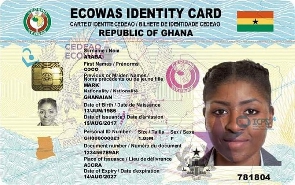Mr Bernard Anaba, a Policy Analyst has asked government to ensure a high rate of access of the National Identification Card (Ghana card) by public sector workers to ensure a smooth implementation of the ‘no Ghana card, no salary’ policy.
“If you want to apply such a measure, then you have to ensure that you have given everybody a fair opportunity to be able to access the Ghana card,” he said in an interview with the Ghana News Agency in Accra on Thursday.
Mr Anaba said it was important for government “to be about 99 per cent sure that all the stakeholders [public sector workers] that are going to be involved have access to the card.”
He noted that over the years, governments had had different forms of identification documents, but they had not been able to help in weeding out ‘ghost names’ on the payroll.
“This implies that people at the helm of affairs have not been really serious about it,” the Policy Analyst said.
“So, if after the implementation of the Ghana card for some years now, and we think that it’s a full proof in terms of data and identifying people as who they are, then it’s right to consider it as means to solve the ghost names issue,” he said.
He said it was necessary for government to show commitment in the implementation of the policy, saying, “they must walk the talk, and come out to let the people know what has been achieved through the policy.”
“For citizens, once the policy has been taken on board, it’s important to start asking questions after a year or two as to what has happened to the policy and how government has been able to achieve the goals set for it,” he said.
Mr Kwasi Kwaning-Bosompem, Controller and Accountant General, Wednesday announced that effective March 2024, any public sector worker without Ghana Card would risk losing his/her salary.
This follows the launch of a software solutions that integrates the Mechanised Payroll System of the Controller and Accountant General’s Department (CAGD) and the National Identification Authority (NIA) for validation and verification of salaries of government workers.
The measure is to help eliminate ‘ghost names’ from the government payroll, ensure only legitimate government employees are paid, and enhance transparency, efficiency and accountability in the utilisation of public funds.
Business News of Thursday, 11 January 2024
Source: GNA













